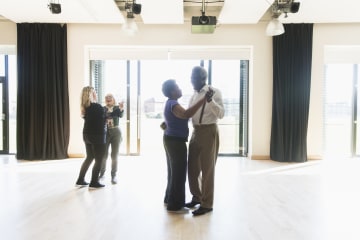Why is being active important as you get older?

Being active is one of the best things you can do for your health. And it's never too late to start. Being active—or getting active, if you aren't already—has definite benefits. It can:
- Give you more energy,
- Keep your mind sharp.
- Improve balance to reduce your risk of falls.
- Help you manage chronic illness with fewer medicines.
No matter how old you are, how fit you are, or what health problems you have, there is a form of activity that will work for you. And the more physical activity you can do, the better your overall health will be.
What kinds of activity can help you stay healthy?
Being more active will make your daily activities easier. Physical activity includes planned exercise and things you do in daily life. There are four types of activity:
- Aerobic. Doing aerobic activity makes your heart and lungs strong.
- Includes walking, dancing, and gardening.
- Aim for at least 2½ hours spread throughout the week.
- It improves your energy and can help you sleep better.
- Muscle-strengthening. This type of activity can help maintain muscle and strengthen bones.
- Includes climbing stairs, using resistance bands, and lifting or carrying heavy loads.
- Aim for at least twice a week.
- It can help protect the knees and other joints.
- Stretching. Stretching gives you better range of motion in joints and muscles.
- Includes upper arm stretches, calf stretches, and gentle yoga.
- Aim for at least twice a week, preferably after your muscles are warmed up from other activities.
- It can help you function better in daily life.
- Balancing. This helps you stay coordinated and have good posture.
- Includes heel-to-toe walking, tai chi, and certain types of yoga.
- Aim for at least 3 days a week.
- It can reduce your risk of falling.
Even if you have a hard time meeting the recommendations, it's better to be more active than less active. All activity done in each category counts toward your weekly total. You'd be surprised how daily things like carrying groceries, keeping up with grandchildren, and taking the stairs can add up.
What keeps you from being active?
If you've had a hard time being more active, you're not alone. Maybe you remember being able to do more. Or maybe you've never thought of yourself as being active. It's frustrating when you can't do the things you want. Being more active can help. What's holding you back?
- Getting started. Have a goal, but break it into easy tasks. Small steps build into big accomplishments.
- Staying motivated. If you feel like skipping your activity, remember your goal. Maybe you want to move better and stay independent. Every activity gets you one step closer.
- Not feeling your best. Start with 5 minutes of an activity you enjoy. Prove to yourself you can do it. As you get comfortable, increase your time.
You may not be where you want to be. But you're in the process of getting there. Everyone starts somewhere.
How can you find safe ways to stay active?
Talk with your doctor about any physical challenges you're facing. Make a plan with your doctor if you have a health problem or aren't sure how to get started with activity.
If you're already active, ask your doctor if there is anything you should change to stay safe as your body and health change.
If you tend to feel dizzy after you take medicine, avoid activity at that time. Try being active before you take your medicine. This will reduce your risk of falls.
If you plan to be active at home, make sure to clear your space before you get started. Remove things like TV cords, coffee tables, and throw rugs. It's safest to have plenty of space to move freely.
The key to getting more active is to take it slow and steady. Try to improve only a little bit at a time. Pick just one area to improve on at first. And if an activity hurts, stop and talk to your doctor.
Where can you learn more?
Go to http://www.healthwise.net/patientEd
Enter P600 in the search box to learn more about "Learning About Being Active as an Older Adult".
Current as of: September 24, 2025
Author: Ignite Healthwise, LLC Staff
Clinical Review Board
All Ignite Healthwise, LLC education is reviewed by a team that includes physicians, nurses, advanced practitioners, registered dieticians, and other healthcare professionals.

